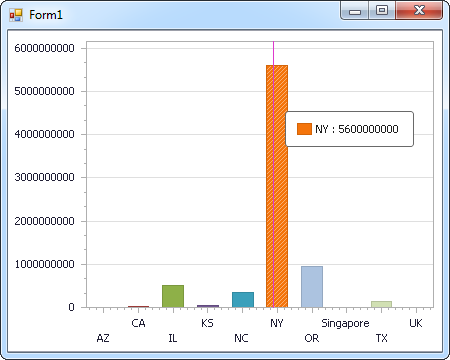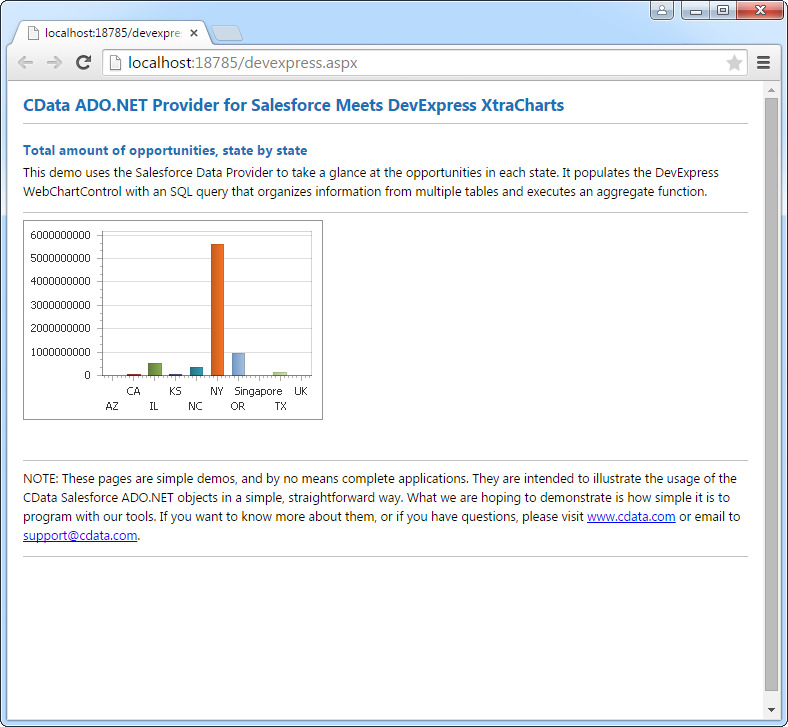Discover how a bimodal integration strategy can address the major data management challenges facing your organization today.
Get the Report →DataBind QuickBooks POS Data to the DevExpress Data Grid
Use the CData ADO.NET Provider for QuickBooks POS with the DevExpress Windows Forms and Web controls to provide QuickBooks POS data to a chart.
The ADO.NET Provider for QuickBooks POS by CData incorporates conventional ADO.NET data access components compatible with third-party controls. You can adhere to the standard ADO.NET data binding procedures to establish two-way access to real-time data through UI controls. This article will demonstrate the utilization of CData components for data binding with DevExpress UI Controls (Windows Forms and Web controls), specifically binding to a chart that visualizes live data.
When you are connecting to a local QuickBooks instance, you do not need to set any connection properties.
Requests are made to QuickBooks POS through the Remote Connector. The Remote Connector runs on the same machine as QuickBooks POS and accepts connections through a lightweight, embedded Web server. The server supports SSL/TLS, enabling users to connect securely from remote machines.
The first time you connect, you will need to authorize the Remote Connector with QuickBooks POS. See the "Getting Started" chapter of the help documentation for a guide.
Windows Forms Controls
The code below shows how to populate a DevExpress chart with QuickBooks POS data. The QuickBooksPOSDataAdapter binds to the Series property of the chart control. The Diagram property of the control defines the x- and y-axes as the column names.
using (QuickBooksPOSConnection connection = new QuickBooksPOSConnection(
"")) {
QuickBooksPOSDataAdapter dataAdapter = new QuickBooksPOSDataAdapter(
"SELECT ListId, AccountLimit FROM Customers", connection);
DataTable table = new DataTable();
dataAdapter.Fill(table);
DevExpress.XtraCharts.Series series = new DevExpress.XtraCharts.Series();
chartControl1.Series.Add(series);
series.DataSource = table;
series.ValueDataMembers.AddRange(new string[] { "AccountLimit" });
series.ArgumentScaleType = DevExpress.XtraCharts.ScaleType.Qualitative;
series.ArgumentDataMember = "ListId";
series.ValueScaleType = DevExpress.XtraCharts.ScaleType.Numerical;
chartControl1.Legend.Visibility = DevExpress.Utils.DefaultBoolean.False;
((DevExpress.XtraCharts.SideBySideBarSeriesView)series.View).ColorEach = true;
}

Web Controls
The code below shows how to populate a DevExpress Web control with QuickBooks POS data. The QuickBooksPOSDataAdapter binds to the Series property of the chart; the Diagram property defines the x- and y-axes as the column names.
using DevExpress.XtraCharts;
using (QuickBooksPOSConnection connection = new QuickBooksPOSConnection(
""))
{
QuickBooksPOSDataAdapter QuickBooksPOSDataAdapter1 = new QuickBooksPOSDataAdapter("SELECT ListId, AccountLimit FROM Customers", connection);
DataTable table = new DataTable();
QuickBooksPOSDataAdapter1.Fill(table);
DevExpress.XtraCharts.Series series = new Series("Series1", ViewType.Bar);
WebChartControl1.Series.Add(series);
series.DataSource = table;
series.ValueDataMembers.AddRange(new string[] { "AccountLimit" });
series.ArgumentScaleType = ScaleType.Qualitative;
series.ArgumentDataMember = "ListId";
series.ValueScaleType = ScaleType.Numerical;
((DevExpress.XtraCharts.SideBySideBarSeriesView)series.View).ColorEach = true;
}







